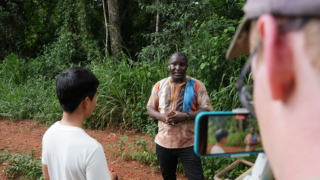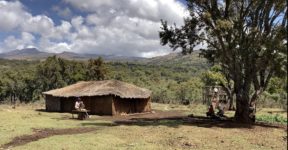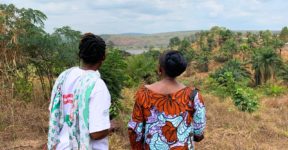
Net-zero’s nature knot: A tug of war with rural realities
In the race to create a net-zero, sustainable world, activities like mining and farming can clash with the lives of people in forests and rural areas. These communities thrive when their lands are cared for responsibly, and when the demand for natural resources is kept in check. However, when international demand drives up resource extraction, the net consequence of this is all-too-often reflected in uncontrolled pollution, widening inequality and other troubling consequences.
You can now listen to this article online.
Finding the right balance in managing natural resources — a balance where people can thrive and regions can prosper for generations — is no easy feat. This becomes all the more challenging when hasty resource extraction threatens this delicate equilibrium, a situation most conspicuous in nations endowed with abundant natural resources.
Ghana is a real-life example of the intricate juggling act between caring for the land, ensuring sustainable livelihoods, and meeting the rising demand for metals and lucrative cash crops. As the international community ponders over solutions for responsible resource management, Ghana's experiences offer invaluable lessons.
Ghana leads the pack in West Africa when it comes to metrics like the sustainable development index, which combines ecological measures of consumption, life expectancy and access to education. Since its 1957 emancipation from British colonial rule, Ghana has blossomed into a vibrant multi-party democracy with a rapidly expanding economy, with exports of natural resources jumping from 4 million tonnes in the 2000s to 14.7 million tonnes in 2020. Besides being an impressive contributor to the world's gold and oil markets, Ghana takes pride in its significant agricultural and forestry yields, including cocoa, timber, and a diverse range of vegetables and oilseeds.
Yet, beneath this prosperous veneer lies a harsher reality: a staggering two-thirds of Ghana's rural residents contend with the weight of multidimensional poverty, which measures poverty across metrics for education, basic infrastructure and financial well-being. Deep-seated issues, notably in land security, housing and health, cast long shadows over this otherwise vibrant nation.
At the prominent sociologist and civil rights activist W.E.B. Du Bois’ house in Accra, the tour guide elaborated on the significance of the national flag’s colours:
‘The red here stands for blood…shared in the quest for freedom. The black stands for skin and the green stands for the resources we have in Africa.’
The central golden belt that provides a backdrop to the black star represents the natural resources of the country, notably gold.
Mining and agriculture should continue to play an economic and social role in Ghana’s development. But when demand for raw goods, such as bauxite or gold, comes at the expense of other sectors, like agriculture, enhanced by pressure factors like high demand for natural resources on global markets and shifts in traditional land use, it can impact negatively on the livelihoods of rural communities.
Conservation and restoration of natural ecosystems also play an important part in the management of land in Ghana. Much of the economic wealth relies on services provided by nature. For example, A Rocha Ghana point to the Atewa forest range, a Global Significant Biodiversity Area, and the 1 million residents of Accra who rely on water from its basin. Conserved sites are also threatened from the fall-out of resource exploitation.

The ability to manage land gives workers a ‘sense of human dignity’, according to Hannah Owusu-Koranteng, a Ghanaian lawyer with Wacam. She continues, ‘We have economic activities which are basically agriculture and mining, for centuries, [and this is what] people practice, especially [in cases like Ghana, where] you are endowed with natural resources.’
‘We Ghanaians are born farmers’, states Agyei Ransford Kofi, a farmer like his parents and ancestors, as well as a conservation worker with A Rocha Ghana in the Atewa Forest Range. Ransford is working to grow food organically and conserve nature. He clearly understands the economic role of farming for the country’s economy. ‘Cocoa gives the whole country about 2 billion US dollars annually in revenue. And now we are going to the IMF for 3 billion [a reference to a recent loan made by the International Monetary Fund to Ghana].’
The state plays a significant role in facilitating mining and agricultural activities, yet the long-term benefits for local communities fall short. Despite Ghana's abundant reserves of gold, bauxite and cocoa, poverty remains a stark reality in the country, especially in rural areas.
In agriculture, the government's support manifests in flagship subsidy programmes like the ‘Planting for Food and Jobs’ campaign. Given the deterioration of environmental quality, Ghana Cocoa Board (COCOBOD) employs hand pollinators to compensate for the decline in bee population. In mining, levies were reduced for importing mining equipment and the government established an end-market for gold in exchange for fuel.
But these policies can often have unintended consequences impacting other areas of the economy and within communities, too.
Currently, the mining sector, for example, can drive wide-ranging environmental, livelihood and social risks. These risks differ across the many types of mining, from the provision of large-scale concessions to international/foreign contractors, for minerals such as bauxite, to small-scale gold mining activities, including illegal artisanal gold mining known as Galamsey[CT1]. They include risks to community cohesion, environmental health, access to safe and gainful livelihoods and a rise in social vices. While artisanal and small-scale mining gold mining (ASGM) has existed for centuries, the ability to fully mechanize the mining process in recent years has ramped up the threat they pose. A few of these issues are highlighted in the slides below.
Many of these risks are most keenly felt – and understood – in the community. This was elaborated on by Rita Antwi Prempeh, Rita Pokua and Deborah Addai, traders and community members in a village in the Amansie South district of the Ashanti region:
The tight balance between sustainable resource management and exploitation can be tipped in the direction of the latter because of the current set of incentives and limited alternatives. In conversation with researchers at the CSIR-Forestry Research Institute of Ghana (CSIR-FORIG), the first priority for workers is to ‘do whatever it takes to be able to care for their families’.
There is likely no policy or regulatory silver bullet to solve unsustainable resource extraction; as researchers at CSIR-FORIG pointed out, ‘so long as the livelihood needs [of workers and their families] have not been provided’. Instead, the pathway to sustainable resource management also needs to unpack the many ‘negative consequences on the social fabric’, from health to education, employment and wellbeing.
Many of the risks of exploitative mining are unbalanced within the community. For example, farmers have little agency on whether landowners provide rights for mining activities on their land and pregnant women are particularly vulnerable to heavy metal toxicity in drinking water and foods. Uneven risks and benefits of exploitative mining can lead to disunity within the community on what the preferred way forward is, which was elaborated on by Joseph Antwi Prempeh, a local youth activist in the Amansi South region, ‘People with their own personal interests instead of the interest of the communities. So because of that, the mining company has also decided not to intervene much into our matters… [which makes it] very difficult for you to get to what [we] want’.
Communities are aware of some of the risks of mining activities that cause environmental or social issues, but there is a need for wider engagement on the impacts this can entail, and the actions that communities can take to avoid these. However, complex forces, such as the relationships between traditional governance, the community and various bodies of the state, and mining companies or other forms of outside involvement or investment, can reduce community agency. These challenging relationships emerge from the varying interests in the mining industry, creating concession conflicts, whereby state and traditional authorities disagree on the award of concessions. This results in navigations by local and traditional leaders and users of land to engage in illegal leasing of their lands to various mining companies and individuals outside of the mining scheme sanctioned by the state.
Hannah Owusu-Koranteng believes that it is through education of communities that exploitative mining can be stopped and replaced with sustainable alternatives. She argues that ‘the best option out of this mess is…to get the owners of the resource to become aware that, yes, you have the right to protect your environment, you have the right to protect your dignity, you have the right to protect your economic activity’.
However, as long populations struggle with poverty, it will be difficult to provide an alternative to galamsey and other ASGM type activities among poor communities in resource-rich countries. The challenge is therefore to provide good livelihood opportunities for activities that promote environmental custodianship and responsible mining, both in the immediate and long-term and then equally distributes benefits across the community.
The path to responsible mining is not a straightforward one. It requires effective community engagement and proper valuation of ecosystem services, besides law enforcement and transparency. Doing so will require political will to improve and enforce policies, especially where the legislative framework is comprehensive. Legislation and its enforcement must cover all stakeholders and authorities involved in land ownership, administration and financing.
Responsible mining in practice involves free, prior, and informed consent, and wider information available on mining companies' operations. However, the challenges of responsible mining in Ghana are numerous, including the need for better lines of communication between local communities and mining companies, among local actors and authorities, and the perceived lack of opportunities or benefits from the mining companies' activities felt within the community. Requirements for collecting and access to information flows, both financially, environmentally and socially, on mining companies’ activities are central to ensuring responsible mining is practiced.
Researchers from CSIR-FORIG emphasize the need for enforcement and transparency in the chain of mining operations and transactions. ‘We have some rules and laws that govern these things, but enforcement is not working in Ghana. Transparency in trade is something that would help.’ Importers, the largest of which are Switzerland and the UAE, in particular, have a role to play in this, by encouraging adhesion to and strengthening of extractives procurement and supply chain standards, such as the EITI.
Diversification is key. The focus on regulation alone has proven insufficient due to the extremely limited livelihood choices for local communities and the complicity of law enforcing agents in the mining business. Commenting on the lack of opportunities in the countryside, for instance, Daryl Bosu, Deputy National Director at A Rocha Ghana, recommends policies and investments to contribute to a ‘mix of strategies’. In his own words, ‘We need to guide a sustainable use of this [land] because, frankly, I do not believe that we cannot mine ourselves out of unemployment. We need to diversify and look at what other green options exist for us’. Daryl adds that other green options could include ‘looking at promoting some agri-based industry…We are just too dependent on just producing the raw material so that I'm sure we could create more jobs if we start adding value by processing, packaging and even doing some… local level marketing of the product.’
The path to responsible mining is also dependent on creating viable pathways for responsible farming and land-use management. Sustainable tourism and proper valuation and compensation for ecosystem services could help in this regard. Researchers at CSIR-FORIG go on to say that international mechanisms for new models of resource valuation, such as carbon markets, REDD+ payments or cash generated from integrated agro-forestry systems, offer some potential, stating ‘so valuation of resources, if that is an international concern, and [if] we really pay attention to that, it would translate to the local level’.
The road ahead for sustainable development and resource use is paved out in international treaties and agreements, but its success will be dependent on whether it will be walked by people in communities around the world. Recognizing the need to build bridges between international narratives and local realities, challenges and hopes, it is essential to address the complexity of the drivers that influence people’s livelihoods, which can often be forgotten at the international level.
A key message that resounded across interviews with people invested in trying to build those futures in Ghana was the need to support economic diversification and balance in the mining and agriculture sectors. Balanced land-use systems and investments could be better achieved through promoting agro-based industries and increasing supply-chain integration for Ghanaian produce, shifting away from an export-oriented economy for processing of goods and materials to focus on local development. This would require supporting farmers to expand into a diverse range of agricultural and forestry products and rural services such as ecotourism and provision of clean water.
Removing obstacles to new forms of sustainable resource management must be combined with withdrawing of drivers that support the status quo of continued over-exploitation. Three areas that are critical are enhanced community engagement and education, increasing enforcement of regulations and the mainstreaming of responsible mining practices. Reforms in trade policies, supply chain transparency and accountability, and international development practices can also support such transitions. Notably, the ‘international community’ has a role to play in redressing overconsumption.
Solving the world’s greatest issues, like the transition to net-zero, protecting nature or sustainable resource production and consumption, can only be realized if we understand what solving these at the community level looks like. This is because scaling of sustainability action means little if it does not ensure integrity in its building blocks. Doing so requires responsibility, accountability and solidarity in shaping a sustainable future for Ghana and other tropical forest countries.


